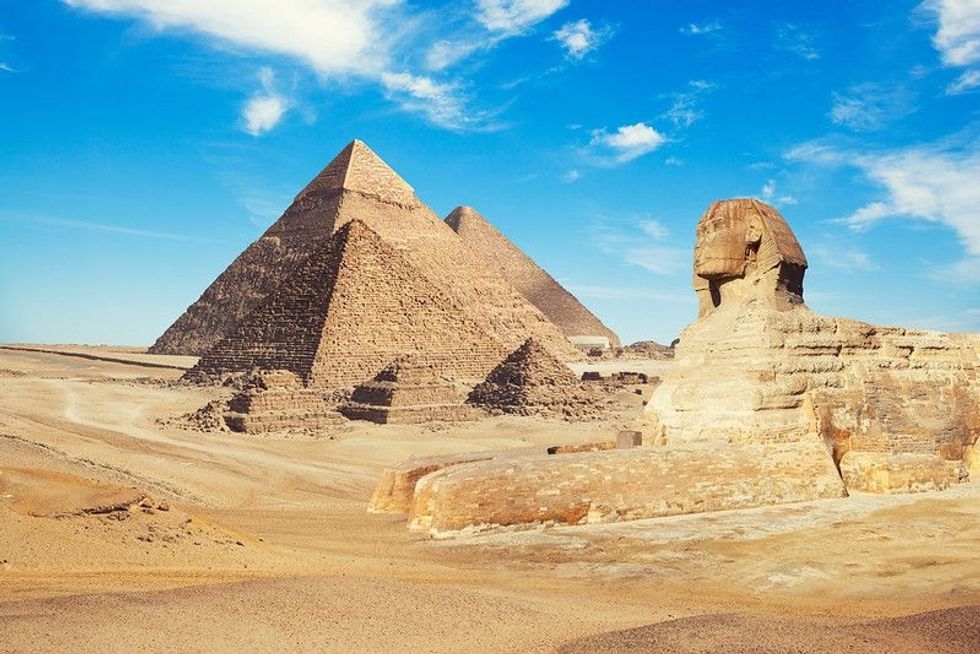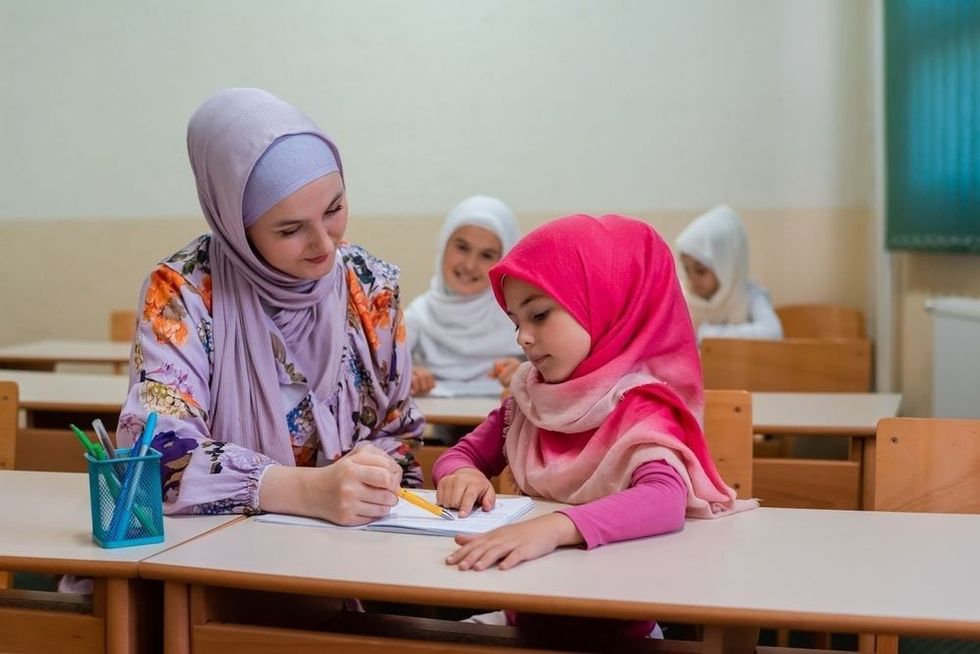200+ Arabic Last Names With Meanings And History

Looking for a suitable last name for your new fictional character?
Last names carry with them a lot of history and ancestral culture. That is why it is very important to have a good understanding of the true meaning behind a surname before bestowing it on your character.
Arabic surnames are usually based on the tribes, habitation, or occupation of the ancestral families. Many a time, the last name is an honorific title that had been gifted to one of the ancestors.
Another common practice is the addition of the prefix "Al" before the surname. The prefix "Al" basically means "The" which essentially defines the meaning of the surname more firmly; for example, the surname "Al-Amin," meaning "The Trustworthy".
Most Popular Arabic Last Names
Each Arab-speaking region usually has a different set of last names that are the most popular. However, here is a list of some generic last names that are usually quite common regardless of region.
- Abadi meaning "eternal". This surname implies being the descendants of the Abbad tribe.
- Abdullah meaning "servant of God".
- Abbas meaning “Lion”. The name famously belonged to an uncle of the prophet Muhammad and to the standard-bearer for the Ahl al-Bayt who was martyred at the Battle of Karbala
- Ahmad meaning "the praised one". Its variant, Ahmed is among the most popular Syrian last names.
- Ali meaning "exalted" or "elevated".
- Allah meaning "God". This surname happens to be topping the charts when it comes to Jordanian surnames. It also is one of the most common Lebanese last names.
- (Al) Amin meaning "the trustworthy" ins Prophet Muhammad.
- (Al) Anwar meaning "more enlightened" or "luminous". Variations include Anwer, Anwaar, Anouar, Anvar, Enver, Anoir, Anouar and Al Anouar.
- Asghar meaning "smallest".
- Ayad meaning "blessing, powerful".
- (Al) Baghdadi meaning "from Baghdad".
- Bakir meaning "dawn".
- Bilal meaning "the victorious" or "water's glow". This name comes from Bilal ibn Rabah, the first Muezzin in Islam who was also one of the Companions of Prophet Muhammad.
- Daher meaning "clear, evident".
- Darwish meaning "exploring, wandering".
- Dawoud meaning "beloved". This family name is the Arabic variant of the Christian name, David. Variations include Dawood and Daud.
- Fadel meaning "virtuous, generous".
- Faheem meaning "understanding, intelligent".
- Farid meaning "unique, incomparable." Variations include Fareed, Ferid, and Ferit.
- Farook meaning "the one who distinguishes between right and wrong." Spelling variations include Farouk, Faruqi, Farook, Faruk, Faroeq, Faruq, Farouq, Farooqi, Faruque and Farooqui.
- Gaddafi meaning "the archer" or "thrower". This Arabic surname can be linked to the Libyan politician and revolutionary, Muammar Gaddafi, popularly known as Colonel Gaddafi.
- Gebran meaning "to restore or to repair." Variations include Gibran, Goubran, Gubran, Jebran, Jibran, Joubran and Jubran.
- Ghulam meaning "servant of God".
- Habib meaning "beloved". It is also sometimes given as a title to someone who is very respectable and honorable.
- (Al) Hadid meaning "iron". Two really famous namesakes of this Arabic last name would be the supermodel sisters, Gigi and Bella Hadid.
- Hafeez meaning "guardian". Variations include Hafiz, Hafiez, Hafidh, Hafeedh, and Hefiz.
- Hakim meaning "learned wise." Variations include Hakeem, Hakiem, Hakime
Hakem, and Hakam. - Harith meaning "the great lion" or "he who digs the earth".
- Hasan meaning "handsome, manly, benefactor". Hasan was the grandson of Prophet Muhammad. Its variant, Hassan is also one of the very popular Arabic last names.
- Haqq meaning "truth." Variations include Haq, Haque, Hoq, Hoque, and Huq.
- Hourani meaning "one from Houran." Variations include Hawrani, Horani, Haurani, Howrani and Hurani.
- Hussain meaning "beautiful, handsome".
- Ibrahim meaning "father of many".
- Iqbal meaning "good fortune, prosperity". This last name can be associated with Allama Iqbal, a highly renowned Indian poet and philosopher of the Modern Era.
- Irfan meaning "knowledge, awareness".
- Ishaq meaning "one who laughed." Variations include Ishak and Eshaq. It is the Arabic version of Isaac.
- Jalal meaning "majesty, glory". Often used to describe the attributes of God in the Holy Bible and the Quran.
- Karim meaning "honorable".
- Khalid meaning "eternal". Another popular variant of this family name is Khaled and it can be linked with the popular American music producer, DJ Khaled.
- Khan meaning "king". Out of all other family names, Khan is the most common one in Saudi Arabia.
- Khoury meaning "priest".
- Malik meaning "king". One of the most famous personalities bearing this last name is British singer, Zayn Malik.
- Mohammad meaning "praised". There are various variants of this surname such as Mohamed and Muhammad. This name originates from Prophet Muhammad, the founder of Islam.
- Noor meaning "the light".
- Qadir meaning "Almighty". Other common variants of this last name include Kadir, Qadir, Kader or Ghader.
- Qureshi meaning "member of the Quraysh Tribe of Mecca".
- Rafiq meaning "intimate friend, companion".
- (Al) Rashid meaning "the right minded". It is believed, al-Rashid is one of the ninety-nine names of God (Allah).
- Sultan meaning "ruler".
- Syed meaning respectful man". This name was used as an honorific title for those who were believed to be the direct descendants of Prophet Muhammad.
- Wahid meaning "absolute one".
- Yusuf meaning "he will". This is an Islamic variant of the Biblical name, Joseph.
- Zaman meaning "time, era".
- Zamzam is Arabic for "the far or light sound," "abounding water," or "water between salty and pure." It is the name of a well in Mecca, and Muslims consider its waters to be good because a supernatural miracle caused it to occur.
Most Common Egyptian-Arabic Surnames

Here are last names that are really popular in Egypt and have an Arabic origin.
- Abaza has Turkish roots and means “Kings”. The name belongs to one of Egypt’s largest and most influential aristocratic clans.
- Abdul Samad is based on as-Samad, one of the names of God as written in Qu’ran. It means "servant of the Self-sufficient Master" or "servant of the Eternal Refuge".
- Abouzeid meaning powerful and complete.
- Abdel-Azim meaning "devoted servant of the magnificent". The name is derived from one of the names of Allah in Islam, Azim, meaning "great or magnificent."
- Adel meaning "just".
- Ahmad - Based on one of the names of prophet Muhammad, the name means ‘most praised’. Variations include Achmad, Achmat, Achmed, Ahmed, Akhmed, Achmet, Ahmat, Ahmet, Ahmadu, Amadou, Ahmot, Amadu.
- Amer meaning "one who has a long and prosperous life".
- Ashour meaning "strongest Assyrian king"
- Ashraf meaning "most honorable one".
- Atef meaning "the kind one". Variations include Atif and Atiph.
- Awad meaning "lute maker" or "lute player". This name as a first name would mean "kindness" or "reverence".
- Azmy meaning "one who has patience, loyalty, perseverance or determination."
- Badawi meaning "rustic". The name is made popular by Ahmad al-Badawi who is venerated by Sunni Muslims as a saint.
- Badir meaning "shining".
- Darwish derived from the Turkish and Persian word “Dervi,” meaning “beggar” or “needy.” This surname was originally used to refer to ascetics and holy men.
- Dewedar, which is also spelled Dewidar, is a last name which means the person who holds the inkwell.
- Ebeid meaning "gracious, divine". One spelling variation is Obeid.
- El-Guindi meaning soldier.
- Elsayed meaning "the master". This Arabic last name can be linked with the Egyptian documentary filmmaker, Emadeldin Elsayed.
- Farhat has Persian roots and can mean either splendor or status.
- Harb meaning "war." One notable person to have borne the name is Wahshi ibn Harb, a companion of the Islamic prophet Muhammad
- Magdy meaning "glorious, praiseworthy".
- Mostafa meaning "the chosen one". Its other variant that is also popular in Egypt is Mustafa.
- Osman meaning "the chosen one".
- Ramadan meaning "period of Ramadan". The literal meaning is "scorched, parchedness".
- Saad meaning "good luck".
- Said meaning "happy".
- Salem meaning "safe, secure, complete".
- Samir meaning "a holy, jovial or loyal companion".
- Soliman meaning "the peaceful one". It originates from the Biblical name, Solomon.
- Youssef meaning "He Will". Ramy Youseff is a famous American stand up comedian and actor.
Most Common Moroccan-Arabic Last Names
The most common Moroccan surnames are quite similar to the last name in Arabic which is largely common in the Middle Eastern region.
- Abergel comes from the Moroccan Arabic word "Bourjila" which means the "One-footed". Variations include Abargil, Abergil, Abourgil, Abourgal, Abourjal, Abirjal, and Aberjel
- Ait meaning "people of" or "family of".
- Alami. This refers to the people who had migrated from Arabia to Morocco and then had adopted the name Alami from Mount Alam.
- Amine meaning "faithful, trustworthy" This surname can be linked to the Moroccan scientist and Global Energy Prize awardee, Khalil Amine.
- Alaoui. This name comes from the ruling Royal family, the Alaouite Dynasty of Morocco. A noteworthy namesake is Princess Lalla Joumala Alaoui who is the Ambassador of Morocco to the US.
- Aziz meaning "strong, powerful" or "to be cherished".
- Batma is a popular Moroccan patronymic surname.
- Bennouna meaning "son of the whale"
- Cherkaoui meaning "from the East".
- Elbaz meaning "the falcon". Variations include Al-Baz, Albaz or ElBez.
- Elharar meaning "the freed" or "the liberators". The name is based on Moroccan families who bought back individuals kidnapped by pirates.
- Hajji meaning "one who has completed the Hajj to Mecca".
- Idrissi meaning "studious".
- Khalil meaning "friend".
- Lahlou meaning "sweet".
- Lamrani meaning "from Amran". Variations include Amrani and El Amrani. The surname is linked to a former prime minister of Morocco, Mohammed Karim Lamrani.
- Mansouri. This last name has been derived from the Sufi Saint, Khwaja Mansour al Hallaj.
- Mehdi meaning "rightly guided".
- Naciri meaning "the helper".
- Naji meaning "survivor".
- Rachid meaning "the high one".
- Rauf means "kind, affectionate, benign", "sympathetic, merciful" or compassionate.
- Sbai meaning "affectionate" or "one who longs for something".
- Slimani meaning "peaceful". It is based on the Biblical name, Solomon.
- Tazi meaning "From Tayyi Tribe".
Most Common Asian-Arabic Last Names
Arabic last names are common in many parts of Asia, especially Lebanon and Jordan as these countries have a high population of Muslims. In India, there is a large group of people with Punjabi Muslim last names.
- Aamir meaning one who is rich and prosperous, civilized, amply settled. The name is made prominent by one of Bollywood’s most prolific and successful actors, Aamir Khan.
- Aamil meaning a doer, a workman or one who is effective. A variation of this name is Amil.
- Akif meaning "focused, attached, intent, devoted". Variations include Akef and Aqif.
- Akram is a comparative form of Karim and means ‘more generous’ ‘nobler’, ‘kinder’. Variations include Ekrem and Eqrem.
- Alavi meaning "follower of Ali" or "descendant of Ali". Variations include Alawi, Alvi, Alaoui and Allawi.
- Amir meaning prince or commander. One variation is Ameer.
- Asem meaning "savior, protector, guardian, defender." Variations include Asim, Aasem and Assem.
- Atwi meaning "faithful" is a popular Lebanese surname.
- Bahij meaning "splendid or handsome".
- Bahjat meaning "happiness".
- Bahri meaning "marine maritime", as it a derivative of the word "bahr" meaning sea.
- Basri meaning "my vision".
- Bukhari meaning "one who comes from Bukhara." Variations include Bokhari, Bukhary and Bukhori.
- Chakroun meaning "thankfulness or gratitude. It is the third most common surname in the South of Lebanon. Variations include Shakroun, Chakaroun, Shakaroun, and Chekroun.
- Chalhoub meaning "to warm oneself by the fire". The name is made popular by the French billionaire Patrick Chalhoub, the founder of Chalhoub Group.
- Dehlavi meaning "from Delhi." The toponymic surname can also be spelled as Dehlvi or Dehlawi.
- Fakhouri meaning "proud." Variations include Al-Fakhoury, Al-Fakhouri, El-Fakhoury, Fakhoury and El-Fakhouri.
- Hilaly meaning "crescent-like." One variation of this name is Hilali.
- Mazur means "accepted" or "approved" and can also be spelled Manzoor or Manzour.
Most Common Middle Eastern Arabic Last Names
In the Middle East, last names are often derived from occupations, geographic locations, or even personal traits. For example, the last name "Khattabi" comes from the Arabic word for "scribe," while "Al-Najjar" means "carpenter."
- Aamer meaning an ordering person, a ruler.
- Abdennour - servant of light. Variations include Abdelnour, Abdnor, Abdulnour and Abd al-Nur.
- Abdul Manaf is based on Manaf, one of the pre-Islamic idols in Makkah and it means “servant of Manaf”.
- Abulafia - With an origin in medieval Spanish, the name means "Father [of] the Health/Wellbeing" or "Owner [of] the Power." Variations include Aboulafia, Abolafia, Abouelafia, Aboulafiya, Abulafiya, Aboulafiyya and Abolafia.
- Adil meaning honest, fair or just, variations include Adeel, Adel and Adli
- Adnan meaning "a person living in two paradises", "a person living in two times", "settler, pioneer".
- Ahad meaning "one"
- (Al) Ajami meaning "mute", used to refer to someone whose mother tongue is not Arabic
- Assad meaning "lion". It is made popular by the Al-Assad family which has produced two Syrian presidents.
- Atassi meaning "the sneezer". It belongs to the famous al-Atassi family of Syria.
- Al-Attar meaning "perfumed, sweet-smelling, aromatic, fragrant." Variations include Atir and Ater. One famous person bearing this name is Najah al-Attar, the first Arab woman to ever become the vice-president of Syria.
- Alzahrani used to refer to the Zahran tribe in Saudi Arabia and likely meaning "the blossoming one". It is made famous for its use in Saudi Arabia for the third royal family members.
- Al-Zoubi used most commonly in Middle Eastern regions. Variations include El-Zoubi, Zoubi, Zouabi, El-Zaabi, Zoabi and Zuabi.
- Atiq meaning "old" or "ancient." Variations include Ateeque, Ateeque, Ateeq, Atteq, Ateek, and Atik.
- Atiyah meaning gift, benefit, boon, favor or present." Variations include Ateah, Atiyeh, Attiah, Attieh, Atieh, Atiya, Atiyya, Attiya, Attiyah, Attyé, Ateya, Attua, Antuya and Atia.
- Awan meaning "supportive or helpful".
- Ayad meaning "benefits or blessings".
- Al-Balushi meaning "from Baloch". The name is quite popular in the United Arab Emirates, Kuwait, Qatar and Bahrain.
- Ammar means compassionate, reverent, dignified, strong in his beliefs, persistent in his affairs, pleasant-smelling, prayerful, and well-built.
- Ben Yahia is based on the Arabic word meaning "he will live", prefixed by the Hebrew patronymic Ben which indicates "son of". One variation is Ben Yahya.
- Bousrani meaning "from the garden". Variations include Boustany, Bisteni, Bistany, Bostany, Bustani, Besteni, and Bestene.
- Bseiso meaning "light it up". Variations include Beseiso, Bsaiso, Besaiso, Bsiso, Bsisu, Bseisu and Besiso.
- Chishti is an Afghan toponymic surname meaning "from Chisht. It is also spelled as Chishty.
- Faheem meaning "intelligent, understanding, keen". Variations include Fahiem, Fahim and Fehim.
- Faizan meaning "benefit, generosit, or beneficence". Variations include Faydhan, Faizon, Faidhan, Faizaan, and Fayzan.
- (Al) Harthi meaning "good provider." One spelling variation of this name is Al-Hareth.
- Hejazi meaning from Hejaz. Variations include Hijazi, Hijazy, Higazi and Hegazi.
- Howayek meaning "weaver." Variations include Hoyek, Hawayek, Hayek and Houwayyek.
- Qureshi means a member of the Quraish tribe which is very common in Pakistan and Saudi Arabia. Spelling variations of this name include Qureyshi, Quraishi, Qurayshi, Qureshy, Quraishy, Qoraishi, Qoreshi, Koraishi, Kureshi, Kureshy, Kureishi, and Coreish.
- Rizvi is a surname frequently associated with Muslims who are descendants of the Islamic Prophet Muhammad through his daughter Fatimah. It is also spelled as Rizavi and has other variations such as Radawi, Radhawi, and Razavi.
Less Common Arabic Last Names

Take a look at some less commonly found Arabic last names and meanings that they possess, from various regions around the world.
- Abed meaning "worshiper, devout".
- Abidin - meaning ‘worshippers’ or ‘adorers’
- Al-Bayati derived from the Bayat tribe, which can be found in Iraq, Iran and Turkey.
- Al-Enezi meaning "from the Anazzah tribe." The name is associated with high political and royal statuses in Saudi Arabia, Kuwait, Qatar, and other countries in the Middle Eastern Gulf.
- Anouar meaning "light".
- Aqeel meaning "knowledgeable, wise".
- Bakir meaning "early comer"
- Bachir meaning "the one who brings good news".
- Bayoumi meaning "blueness of river Nile". It was also used for someone who was respected by others. It got its name from the Bayoum village in Egypt.
- Benayoun meaning precious. Possible variations include Benayon and Benayun. The name was made popular by Yossi Benayoun, an Israeli international soccer player.
- Bishara meaning "good news". This is the Arabic version of the word Gospel.
- Boulos meaning "humble". This is the Arabic version of the name Paul.
- Boutros meaning "rock". This is the Arabic version of the name Peter.
- Chahuán meaning luxurious, voluptuous or sensual.
- Al-Dimashqi meaning "one from Damascus."
- Din meaning religion. A lot of other Arabic last names have Din attached to them.
- Entezam meaning "discipline, order".
- Essa meaning "Jesus". It is the less commonly found variant of the Arabic surname name Isa.
- Faez meaning "victorious, successful"
- Fahri meaning "honorary". The name can also be spelled as Fakhri.
- Fakhar meaning "pride", "honor", "glory." One variation of this name is Fakhr.
- Faraj meaning "joy after sadness".
- (Al) Farsi meaning "the Persian.
- Fawzi meaning "triumph." Variations include Faouzi, Fawzy and Fevzi.
- (Al) Ghazzawi derived from Gaza, Palestine.
- Hajjar meaning "stone".
- Halabi meaning "from Halab" (Aleppo in Syria). Variants include Halaby, Haleb, Halep, and Halepovich.
- Halawa (Egyptian Origin) meaning "sweets".
- (Al) Harbi meaning "from the Harb Tribe". The Saudi Arabian scholar, Abdul Aziz-al-Harbi is one of the noteworthy namesakes.
- Hatem meaning "Decisive."
- (Al) Homsi meaning "From Homs, Syria".
- Ihsan meaning "perfection, beauty, excellence".
- Jaafar meaning "small stream, creek".
- Jubran meaning "to help the Poor" or "to make good change".
- Karam meaning "generosity, supportive".
- (Al) Khaldi meaning "member of the Tribe, Bani Khalid". This tribe descends from the Arab commander, Khalid ibn al-Walid who was also the senior companion of Prophet Muhammad.
- Al-Khatib meaning preacher, scholar, speaker.
- Latif meaning "gentle, kind".
- (Al) Liby - literally means ‘the Libyan’. Variations include al Libi, al-Libi, al-Liby and al-Libby
- Marwan means "strong lion" or "leader." Also spelled as Marouane, Marouan, Merwan or Mervan.
- Mukhtair meaning "chosen".
- Mustapha meaning "chosen, selected". A variant of the more common surname in this region, Mustafa.
- (El) Ouazzani meaning "from the town of Ouazzane, Morocco".
- Rabah meaning "winner".
- Rajab The name given to the seventh Arab month which means prestige. It was so named because fighting was forbidden throughout it.
- Sarkis meaning "protector". This name comes from the martyred Christian saint, Sergius.
- Shehab meaning "meteor, shooting star".
- (Al) Shishani meaning "the Chechen". It is commonly found in Chechen diasporic families.
- Taleb. This name means "one who seeks knowledge" and "devoted student." It was the name of one of the uncles to Prophet Muhammad.
- Tawil meaning "tall".
- Wahba meaning "gift, present".
- Waked means "brilliant". Other spelling variations include Waqid and Wajid.
- Yacoub meaning "to follow". The name comes from Prophet Ya'qub, who is the Islamic variant of the Biblical patriarch, Jacob.
- Yasin is an epithet of the Prophet Muhammad and is also spelled as Yassin, Yaseni, Yassine, Yaseen, Jasin and Yacine.
- Ziadeh meaning "overabundance, surplus". This family name is mostly seen in Lebanon. This family name can be linked with the early twentieth-century Lebanese-Palestinian poet, May Ziadeh.
We Want Your Photos!
More for You
See All
Bachelor of Arts specializing in English, Master of Arts specializing in English

Rajnandini RoychoudhuryBachelor of Arts specializing in English, Master of Arts specializing in English
With a Master of Arts in English, Rajnandini has pursued her passion for the arts and has become an experienced content writer. She has worked with companies such as Writer's Zone and has had her writing skills recognized by publications such as The Telegraph. Rajnandini is also trilingual and enjoys various hobbies such as music, movies, travel, philanthropy, writing her blog, and reading classic British literature.
Disclaimer
1) Kidadl is independent and to make our service free to you the reader we are supported by advertising. We hope you love our recommendations for products and services! What we suggest is selected independently by the Kidadl team. If you purchase using the Buy Now button we may earn a small commission. This does not influence our choices. Prices are correct and items are available at the time the article was published but we cannot guarantee that on the time of reading. Please note that Kidadl is a participant in the Amazon Services LLC Associates Program, an affiliate advertising program designed to provide a means for sites to earn advertising fees by advertising and linking to Amazon. We also link to other websites, but are not responsible for their content.
2) At Kidadl, we strive to recommend the very best activities and events. We will always aim to give you accurate information at the date of publication - however, information does change, so it’s important you do your own research, double-check and make the decision that is right for your family. We recognise that not all activities and ideas are appropriate for all children and families or in all circumstances. Our recommended activities are based on age but these are a guide. We recommend that these ideas are used as inspiration, that ideas are undertaken with appropriate adult supervision, and that each adult uses their own discretion and knowledge of their children to consider the safety and suitability. Kidadl cannot accept liability for the execution of these ideas, and parental supervision is advised at all times, as safety is paramount. Anyone using the information provided by Kidadl does so at their own risk and we can not accept liability if things go wrong.
3) Because we are an educational resource, we have quotes and facts about a range of historical and modern figures. We do not endorse the actions of or rhetoric of all the people included in these collections, but we think they are important for growing minds to learn about under the guidance of parents or guardians.







